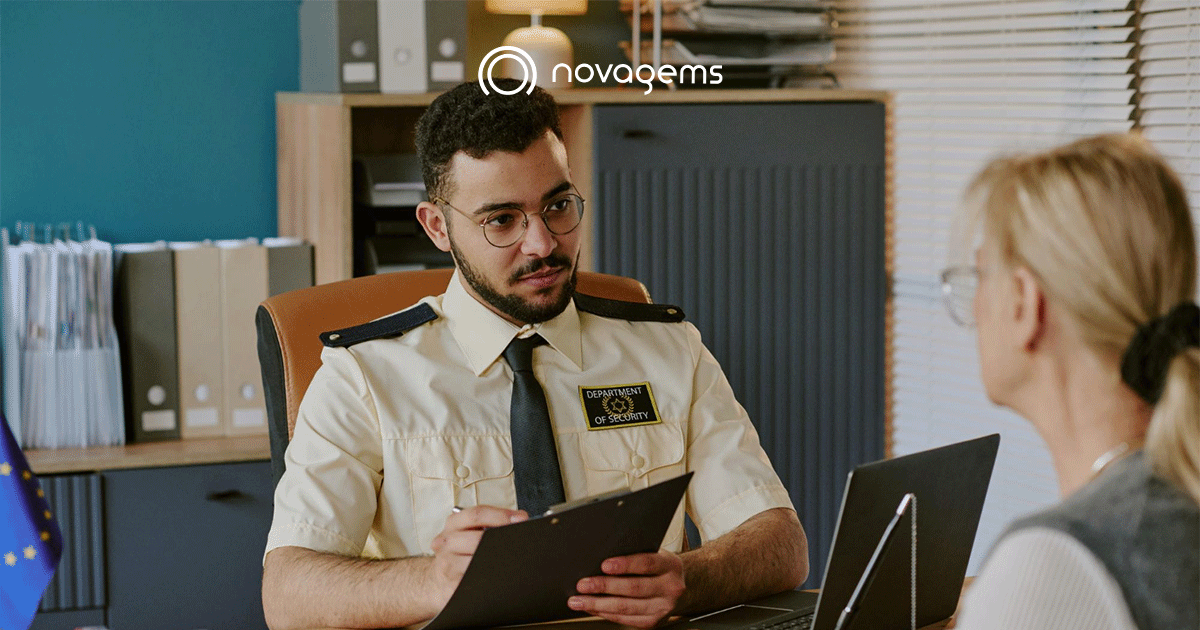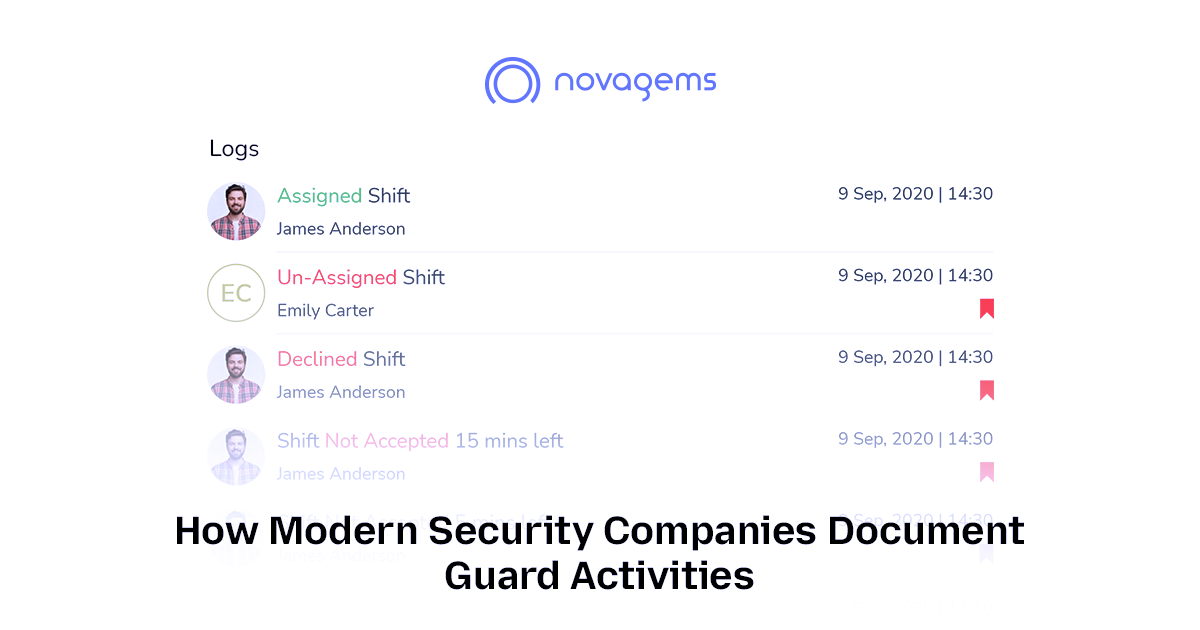How to Hire a Security Guard in 2025
Published on: Mon, Aug 25, 2025
Read in 8 minutes

Key Takeaways
- Prices differ: In 2025, the cost of hiring a security guard is $15–$30/hr unarmed and $25–$60+/hr armed in the U.S., and Canada averages $15–$60/hr by province and service level.
- Licensing is important: The U.S. is state-by-state, whereas Canada requires hiring only from licensed agencies. Check security licenses always.
- Hiring process is important: Establish your risks, select the appropriate type of guard, screen carefully, sign a clear contract, and check performance regularly.
- Technology enhances outcomes: Systems such as guard tour apps, GPS tracking, and software such as Novagems streamline the management of guards and promote accountability.
Hiring a security guard in 2025 is no longer a “nice-to-have” for businesses and property owners, it’s often a necessity. Whether you’re running a retail store that’s seen a rise in theft, managing a condo that needs concierge-style security, or protecting executives who face higher risks, security has become front and center.
But here’s the catch: the security industry has changed. Salaries are higher, licensing conditions are tougher, and technology is now integral in accountability. So the question becomes: How do you get the right security guard, without overspending or jeopardizing your people?
This guide breaks down costs, types of guards, step-by-step hiring, essential skills, and modern tools that make managing guards easier.
How much does it cost to hire a security guard?
Quick Answer: In 2025, it will cost to hire a security guard:
- $15–$30 per hour for unarmed guards in the U.S.
- $25–$60+ per hour for armed guards in the U.S.
- $15–$60 per hour in Canada based on province and type of service.
- $75–$200+ per hour for executive protection in high-risk urban centers such as New York or Toronto.
Security guard services are not cheap nowadays. The companies want to hire security guards that are trained and they are willing to pay more as well
Why so much variations?
Location is everything. A guard in a rural Alberta town might be $18/hr, but downtown Toronto, double that amount. In New York post-pandemic, demand for armed guards has risen astronomically, particularly around financial centers.
Type of guards: Armed guards are always more costly due to their training, licensing, and insurance needs. Executive protection agents (bodyguards) are in a category all their own—usually ex-law enforcement or military.
Risk profile. A security guard for a small shop performing “observe and report” services will be less expensive than a cash-in-transit or event crowd control guard.
Shift coverage. Midnight shifts, 24/7 schedules, or last-minute hirings virtually always cost more.
Budgeting tip: Don’t equate hourly fees. Inquire about included costs (uniforms, training, reporting devices) and “extras” (holiday cover, tech apps, overtime).
How to Hire a Security Guard: The Ultimate Step-by-Step Guide
This is not theory, this is a proven framework used by security guard services in North America today.
Step 1: Evaluate Your Security Requirements and Threat Level
Before you even call an agency, take a moment and jot down your requirements:
- What am I safeguarding? (People, property, valuables, information, or reputation).
- What are the risks? (Theft, vandalism, workplace violence, unauthorized entry).
- When is protection needed? (Daytime, overnight, events, or 24/7).
Pro tip: Most agencies provide free risk assessments, make use of them prior to hiring.
Understand Types of Security Guards
The term security guard covers a wide range of roles. Knowing which type you need will save you money and frustration. And a
Unarmed guards:
- Best for: Retail, office lobbies, residential communities.
- Skills: Customer service, access control, patrols.
- Cost: Lower end of the spectrum.
Armed guards (U.S. only, restricted in Canada):
- Best for: Banks, high-risk cash handling, executives.
- Cost: Higher due to insurance + training.
- Note: In Canada, firearms are restricted to armoured car personnel.
Concierge / lobby security:
- Best for: Condos, hotels, corporate offices.
- Combines customer service with deterrence.
Mobile patrols:
- Best for: Warehouses, construction sites, parking lots.
- Guards check multiple sites in a single shift.
Executive protection (bodyguards):
- Best for: VIPs, CEOs, celebrities.
- Highly trained, high cost.
Remote guarding (tech-enabled):
- Best for: Cost-conscious businesses needing overnight deterrence.
- Uses cameras + AI with live remote agents to intervene.
Step 2: Where to hire a security guard
In the U.S.:
- Reputable agencies (Allied Universal, Securitas, regional firms).
- Job boards like Indeed or ZipRecruiter if you’re hiring in-house.
- Referrals from training schools or ex-law enforcement.
In Canada:
- You must hire licensed guards through licensed agencies. For example: Paladin Security, Paragon, Blackbird, G-Force.
- Independent hires are not an option unless they’re agency-affiliated.
Tip: Always check provincial or state registries to confirm licenses are valid.
Step 3: Vetting, Licensing, and Red Flags to Watch For
This is where most companies make expensive blunders.
Licensing 101:
- USA: Rules vary by state.
- California: 32 hours of training within the first 6 months.
- New York: 8-hour pre-assignment + 16-hour on-the-job.
- Some states have minimal requirements, so vet carefully.
- Canada: Strict provincial licensing.
- Ontario: Private Security and Investigative Services Act (PSISA).
- BC: Security Services Act.
- Armed roles limited to armoured car personnel.
Red Flags to look for
- Guard or agency cannot produce license or insurance documentation.
- No definite post orders or supervision strategy.
- “Too cheap” rates (usually implies unlicensed personnel).
- No call-off replacement strategy.
Step 4: Interviewing & Contract Execution
Consider this like interviewing an employee, you want cultural alignment + professionalism.
Some example interview questions:
- “Tell me about a time you de-escalated a difficult situation.”
- “What’s your process for writing an incident report?”
- “How do you balance customer service with upholding rules?”
Contract basics:
- Clear scope (duties, hours, escalation path).
- Reporting standards (daily activity reports, incident logs).
- Liability + insurance terms.
- Replacement guarantees.
Pro tip: Request a site walkthrough prior to contract finalization.
Step 5: Onboarding & Performance Monitoring Post-Hire
Don’t think the agencies that gives security guard services does it all. Your job is to establish expectations.
- Orientation: Walk guards through your site, alarm systems, and emergency exits.
- Post Orders: Written task list (patrol frequency, visitor logs, reporting process).
- Tech setup: Guard tour systems, GPS check-ins, incident apps.
- Performance reviews: Weekly or monthly check-ins with supervisors.
Modern contracts also include service level agreements (SLAs) with measurable KPIs like:
- Patrols completed.
- Response times to incidents.
- Number of incident reports submitted.
Some security companies also look search if the security guard knows how to operate any systems. Like CCTV surveillance systems, management systems, or mobile patrol systems. Because research found out that traditional patrol systems are often reliant on manual processes and outdatedntechnologies that suffer from inefficiencies such as delayed reporting and human errors
Skills to look for in a security guard
A uniform is not what makes them effective. The ideal guards possess:
- Situational awareness: Picking up on minute details that others overlook.
- De-escalation techniques: Resolving disputes calmly without escalation.
- Communication: Professional with clients, staff, and police.
- Report writing: Clear, factual, and timely.
- Tech literacy: Confident working with smartphones, apps, and cameras.
- Compliance: Up-to-date security license and current training.
The global security guard management software market size was estimated at USD 1.63 billion in 2024, and is projected to reach USD 4.46 billion by 2033, growing at a CAGR of 11.8% from 2025 to 2033. This growth is driven by the growing need for real-time security operations management, digital incident reporting, and workforce automation across various sectors.
How Novagems can help you manage your guards more easily
Getting the right guard is just the beginning. The larger challenge for most companies is operating guards on a daily basis, ensuring shifts are filled, patrols are being completed, and incidents aren’t slipping through the cracks. That’s where Novagems changes the game.
Here’s how Novagems assists security agencies and companies in the USA and Canada:
-
Smart Scheduling & Shift Coverage
Missed shifts are the biggest hassle in the business. With Novagems, managers are able to auto-assign shifts, create recurring schedules, and cover last-minute call-offs in minutes. This eliminates the panic that typically accompanies unforeseen absenteeism.
-
GPS-Based Guard Tours
Knowing whether your guard actually completed patrols is essential. Novagems provides GPS-based checkpoints and scan points. If a guard misses a checkpoint, supervisors get real-time alerts. This eliminates “ghost patrols” where guards stay in one spot but mark themselves present.
-
Real-Time Incident Reporting
Rather than paper logs that are never read, Novagems allows guards to submit incident reports right from within the mobile app using images, videos, and time stamps. Clients are immediately notified, providing transparency and increasing trust.
-
License & Compliance
Tracking Several companies lose contracts due to their guards unknowingly working with invalid security licenses. Novagems continually monitors expiry dates for licenses and training certificates, helping to stay compliant with U.S. state regulations and Canadian provincial legislation.
Excited to see the software in action? Start your free trial today!
Quick Checklist While Hiring Security Guards
- Identify risks and requirements.
- Select guard type (unarmed, armed, mobile, concierge, EP).
- Recruit through licensed agencies (compulsory in Canada).
- Screen licenses, insurance, and red flags.
- Interview with emphasis on de-escalation + communication.
- Lock airtight contracts with reporting standards.
- Onboard with clear post orders + tech.
- Monitor performance weekly.
Conclusion
I hope this answers the most common questions people ask: like “How much does it cost to hire a security guard?” and “What licenses are required?”, so you can confidently hire the right protection for your needs. Security guard jobs are not easy, the guards have to be vigilant and be able to get the trust of both clients and security companies. And security companies can only get security contracts if they have good guards.
FAQ: People Also Ask
Q1. Does security guard require a license in Canada? Yes. All provinces have a requirement for guards to possess a valid security license.
Q2. Can security guards be armed in Canada? No, except in very exceptional cases such as armoured car services.
Q3. How long does it take to become a security license holder in the U.S.? It depends on the state—some issue it within weeks, while others need 30+ hours of training.
Q4. Which industries employ the largest number of security guards in 2025? Retail, healthcare, construction, residential condos, corporate offices, and events.
Get a Free Trial
Sign up For Newsletter
Latest Blog Posts
Get Started
Start being productive & grow your business
with Novagems





